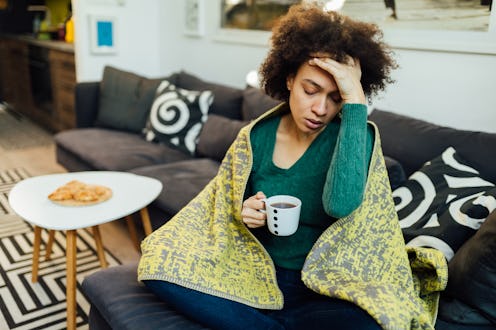Health
Have A Dry January Headache? Here’s Why
Wait, wasn’t the whole point to avoid hangovers?

Going dry for January — cutting out drinking and investing in lemonade and tea for the month — can have a lot of health benefits, like better sleep and clearer skin. But some people will get pounding headaches after a few days off alcohol. Which can feel very unfair; surely going dry is designed to avoid the symptoms of hangovers, right? Doctors tell Bustle that it's actually more common than you think, but the good news is that headaches from Dry January don't last very long.
"Headaches after stopping drinking is a common physical symptom of alcohol withdrawal," Dr. Joseph R. Volpicelli M.D. Ph.D., executive director at the Institute of Addiction Medicine, tells Bustle. If you'd been drinking heavily i.e. having over eight glasses of wine a week, your body and brain may not cope very well with stopping suddenly.
"When alcohol is used chronically, or frequently, neurotransmitters in the individual’s brain create adaptations to the presence of alcohol, so that the brain can maintain proper function," Dr. Lawrence Weinstein M.D., chief medical officer at American Addiction Centers, tells Bustle. "When alcohol use is stopped, that neuronal adaptation no longer works and causes a chemical imbalance." The result is that headache, while your brain tries to rearrange itself to accommodate the change. While not everyone who drinks heavily is necessarily dealing with alcohol use disorder, it's worth bringing this information to a doctor or someone you trust to talk about what it might mean for your drinking habits once Dry January is over.
Another explanation could be that you're not getting enough water. "Dehydration, which is another symptom of withdrawal, can also be the culprit," Dr. Weinstein says. If you haven't replaced your evening wine with another non-alcoholic drink, your brain could lose fluid, and actually shrink. It contracts away from the walls of your skull, and that causes that familiar pain. Dehydration headaches can be resolved prettily easily by drinking more water, and the National Headache Foundation or NHF also recommends getting some electrolyte-heavy drinks, like Gatorade or coconut water, to help rehydrate.
You might want to replace your cocktails with mochas, but the NHF also cautions against using caffeine as a pain relief technique. While caffeine-heavy drinks like coffee can actually help some headaches — they narrow your brain's blood vessels, which can relieve pain — you can also experience mild withdrawals if you skip your daily green tea. And that means, yep, more head pain.
Generally speaking, though, going cold turkey for a month or more can help relieve headaches, if that's a regular issue for you. "There is a known association between serotonin release and migraines, and, as the liver metabolizes alcohol, toxins released into the body can also produce a headache," Dr. Weinstein says. Alcohol is known to be a trigger for migraines, according to the American Migraine Foundation, though different ingredients — like the sulfites in red wine — can cause them, depending on your sensitivities. A study published in 2018 in European Journal of Neurology found that 36% of people with migraines reported that alcohol triggered them, with red wine the most common problem.
If you're newly getting headaches after cutting out booze, know that they shouldn't last very long. "For most people, this mild withdrawal symptom goes away in two to seven days," Dr. Volpicelli says. If it doesn't disappear by that point, talk to your doctor about the issue and other lifestyle changes you may have recently made to figure out a way forward.
If you or someone you know is seeking help for substance use, call the SAMHSA National Helpline at 1-800-662-HELP(4357).
Experts:
Dr. Joseph R. Volpicelli M.D. Ph.D.
Dr. Lawrence Weinstein M.D.
Studies cited:
Onderwater, G., van Oosterhout, W., Schoonman, G. G., Ferrari, M. D., & Terwindt, G. M. (2019). Alcoholic beverages as trigger factor and the effect on alcohol consumption behavior in patients with migraine. European journal of neurology, 26(4), 588–595. https://doi.org/10.1111/ene.13861
This article was originally published on